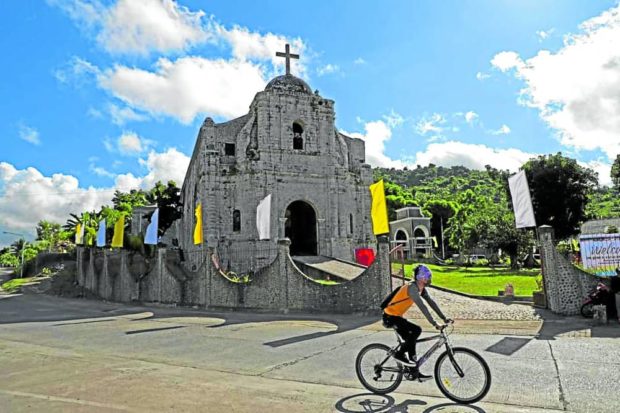192-year-old Catanduanes church back to old glory

SYMBOL OF FAITH The almost 200-year-old St. John the Baptist Parish Church in Bato, Catanduanes, has been restored and declared an “important cultural property” by the National Historical Commission of the Philippines (NHCP). —NHCP PHOTO
LIGAO CITY, Albay, Philippines — The National Historical Commission of the Philippines (NHCP) has turned over to the Diocese of Virac on Tuesday the newly restored St. John the Baptist Parish Church in Bato, Catanduanes.
The 192-year-old structure, perched on top of a hill overlooking the town, is among the tourist attractions of Catanduanes and a favorite wedding location.
The church had taken a beating from strong typhoons through the years which left the structure damaged. It withstood the wrath of Typhoons Sening (international name: Joan) in 1970, Rosing (Angela) in 1995, Loleng (Babs) in 1998, and the most recent Supertyphoon, Rolly (Goni) in 2020.
NHCP Chair Rene Escalante and Virac Bishop Manolo de los Santos on Tuesday led the unveiling of the church’s new historical marker highlighting its cultural importance.
Catanduanes Gov. Joseph Cua, in a telephone interview Tuesday, told the Inquirer that “restoring the church would preserve the oldest (existing parish) in the six provinces of Bicol and also the strong faith of the Catholics in the area.”
Article continues after this advertisementThe parish in Bato town was established by the Spaniards in the 16th century or the latter part of the 1500s. Spanish priests first built a wooden church in the area to serve the new congregation until 1830, when construction started to turn the church into a more formidable building made of coral rocks.
Article continues after this advertisementThe cross-shaped structure was completed 50 years later.
Important cultural property
Cua said the restoration was expected to boost the island province’s tourism industry and attract visitors. Carmel Bonifacio Garcia, Catanduanes tourism officer, in a separate phone interview, said the structure had been considered an “important cultural property” by the NHCP.
This meant that the St. John the Baptist Parish Church would be entitled to future interventions from the NHCP for its maintenance, Garcia said.
According to Republic Act No. 10066, or the National Cultural Heritage Act of 2009, an “important cultural property” is a “cultural property having exceptional cultural, artistic and historical significance to the Philippines, as shall be determined by the National Museum and/or National Historical Institute.”
“All cultural properties declared as important cultural property may also receive government funding for its protection, conservation and restoration. An official heritage marker shall likewise be placed on an immovable cultural property to identify the same as important cultural property,” RA 10066 states.
The NHCP installed site lighting, window screens, a new altar and a lectern. The agency also rehabilitated the church’s floors and tile work, and conducted landscaping, riprap, fencing, and paving works on the grounds.
RELATED STORIES
Loboc church reopens 7 years after Bohol quake